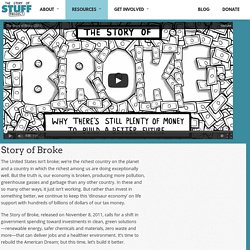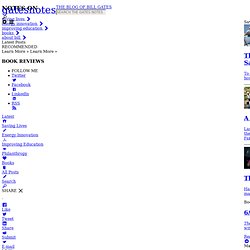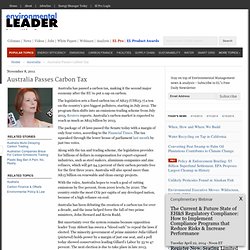

Story of Broke. The United States isn’t broke; we’re the richest country on the planet and a country in which the richest among us are doing exceptionally well.

But the truth is, our economy is broken, producing more pollution, greenhouse gasses and garbage than any other country. In these and so many other ways, it just isn’t working. But rather than invest in something better, we continue to keep this ‘dinosaur economy’ on life support with hundreds of billions of dollars of our tax money. The Story of Broke, released on November 8, 2011, calls for a shift in government spending toward investments in clean, green solutions—renewable energy, safer chemicals and materials, zero waste and more—that can deliver jobs and a healthier environment. It’s time to rebuild the American Dream; but this time, let’s build it better. Credits Show full list of credits. A Simple Solution to the Debt Crisis.
Innovation with Impact: Financing 21st Century Development. In a report presented to world leaders at the G20 summit in Cannes, France, I outlined recommendations to encourage innovation and new partnerships that increase the value and delivery of development aid.

Executive Summary Leadership from the G20 is critically important right now. The global economic situation is as fragile as it has been at any time in the past 50 years. As leaders of the G20, you face a difficult challenge: How do you resolve the immediate crisis while continuing to make smart investments in long-term growth and improved living conditions? During my lifetime, innovations in business, science, and technology have energized the global market economy in unprecedented ways. This progress has benefited everyone, not just the richest. In the past 50 years, a billion people were saved from starvation by advances in agriculture. Aid Has Helped Reduce Child Deaths Dramatically, and Can Continue to Do So I begin the report by describing the paramount importance of innovation. Bill Gates Champions A Financial Transactions Tax: 'This Money Could Be Well Spent And Make A Difference' By Tanya Somanader on November 3, 2011 at 12:01 pm "Bill Gates Champions A Financial Transactions Tax: ‘This Money Could Be Well Spent And Make A Difference’" While Republicans resist any attempt to address growing income inequality, more and more of America’s wealthy are asking to pay their fair share.

Joining billionaire Warren Buffet, Microsoft founder Bill Gates recently issued his support for “millionaires and billionaires” paying more in taxes. Now, Gates is taking it a step further and traveling to the G-20 meeting in Cannes, France today to champion the “Robin Hood tax” — a small financial transaction tax on each stock and bond trade — in order to help financially strapped developed nations meet their global aid pledges to the poor. Aware that countries like the U.S. are not currently receptive to this or any taxes, Gates told the Guardian that hopes his “credibility” lends credence to the idea that such taxes work: Gates is not alone in his effort.
Denmark introduces world's first food fat tax. Australia Passes Carbon Tax. Australia has passed a carbon tax, making it the second major economy after the EU to put a cap on carbon.

The legislation sets a fixed carbon tax of A$23 (US$23.7) a ton on the country’s 500 biggest polluters, starting in July 2012. The program then shifts into an emissions trading scheme from July 2015, Reuters reports. Australia’s carbon market is expected to reach as much as A$15 billion by 2015. The package of 18 laws passed the Senate today with a margin of only four votes, according to the Financial Times.
The tax squeaked through the lower house of parliament last month by just two votes. Along with the tax and trading scheme, the legislation provides for billions of dollars in compensation for export-exposed industries, such as steel makers, aluminum companies and zinc refiners, which will get 94.5 percent of their carbon permits free for the first three years. With the rules, Australia hopes to reach a goal of cutting emissions by five percent, from 2000 levels, by 2020.